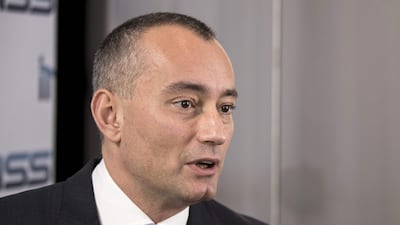Israel must abandon its threat to annex parts of the occupied West Bank, the United Nation’s top envoy to the Middle East has said.
Nikolay Mladenov warned that going ahead with the plan would violate international law and deal “a devastating blow” to the two-state solution.
He also called on the United States, Russia and the European Union to work with the UN to quickly come up with a proposal to enable the four parties in the so-called Middle East Quartet to take up their mediation role and work with countries in the region for peace.
“Israel must abandon the threat of annexation,” he said. “The Palestinian leadership must re-engage with all members of the Quartet.”
Mr Mladenov told the UN Security Council on Wednesday that in the coming weeks all sides should work to preserve the prospect of a negotiated two-state resolution to the conflict.
“These efforts must begin immediately, there is no time to lose,” he said. “The fate of the Palestinian and Israeli people must not be determined by destructive unilateral action that cements divisions and may put peace beyond our reach in our lifetime.”
Israeli Prime Minister Benjamin Netanyahu has vowed to annex the Jordan Valley and Jewish settlements in the Occupied West Bank in line with US President Donald Trump’s Middle East plan, which favours Israel and was rejected by the Palestinians.
Mr Netanyahu formed a new Israeli government earlier this month with his chief rival Benny Gantz. The coalition agreement allows the prime minister to present an annexation proposal to the government as soon as July 1.
Palestinian President Mahmoud Abbas said on Tuesday that the Palestinian Authority will no longer be committed to any signed agreements with Israel or the US, following Israel’s annexation pledge.
US Secretary of State Mike Pompeo said he hoped Mr Abbas’s move would not end security co-ordination.
"We hope that the security arrangements will continue to be in place, that the work that's done on the ground there to keep people in Israel and Palestinians safe will continue," Mr Pompeo said on Wednesday. "I regret that he's decided to abrogate these agreements," Mr Pompeo said.
Mr Mladenov, the UN special co-ordinator for the Middle East peace process, told the council he would meet Palestinian Prime Minister Mohammad Shtayyeh on Thursday “to understand better the practical side of the decision by the leadership and its implications on the ground.”
He said Mr Abbas’s statement also calls for negotiations under international auspices, including by the Quartet, to advance a negotiated two-state solution.
US ambassador Kelly Craft made no mention of Mr Abbas’ statement but acknowledged concerns by many council members about Mr Trump’s peace plan.
“What is needed right now, if we hope to take even a first step in the right direction, is for the parties to sit down with one another,” she said. “If this council is serious about wanting to see progress in the Middle East, then I urge each of you to look seriously at the steps you can take to encourage direct negotiations.”
Immediately before the council met, its four European Union members – France, Germany, Belgium and Estonia – and former member Poland delivered a joint statement. It expressed willingness “to support and facilitate resumed direct and meaningful negotiations between the two parties, to resolve all final status issues and achieve a just and lasting peace.”
The EU members said they are also ready to engage immediately with Israel’s new government and key parties.
The two-state solution, with Jerusalem as the future capital for both states, “is the only way to ensure sustainable peace and stability in the region,” they said. The EU has said it will not recognise any changes to 1967 borders unless they are agreed to by the Israelis and Palestinians.
Russia’s UN ambassador Vassily Nebenzia said the doors to a two-state solution may be closed and “no time should be wasted”. He said international co-operation and action is needed now “as never before.”









